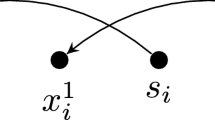Abstract
We study possible winner problems related to the uncovered set and the Banks set on partial tournaments from the viewpoint of parameterized complexity. We first study a problem where given a partial tournament D and a subset X of vertices, we are asked to add some arcs to D such that all vertices in X are included in the uncovered set. We focus on two parameterizations: parameterized by |X| and parameterized by the number of arcs to be added. In addition, we study a parameterized variant of the problem which is to determine whether all vertices of X can be included in the uncovered set by reversing at most k arcs. Finally, we study some parameterizations of a possible winner problem on partial tournaments, where we are given a partial tournament D and a distinguished vertex p, and asked whether D has a maximal transitive subtournament with p being the 0-indegree vertex. These parameterized problems are related to the Banks set. We achieve \(\mathcal {XP}\) results, \(\mathcal {W}\)-hardness results as well as \(\mathcal {FPT}\) results along with a kernelization lower bound for the problems studied in this paper.



Similar content being viewed by others
Notes
In Aziz et al. (2015), the authors use \(\text {PSW}_\text {UC}\) to denote the problem.
References
Aziz H, Brill M, Fischer FA, Harrenstein P, Lang J, Seedig HG (2015) Possible and necessary winners of partial tournaments. J Artif Intell Res (JAIR) 54:493–534. doi:10.1613/jair.4856
Banks JS (1985) Sophisticated voting outcomes and agenda control. Soc Choice Welf 1(4):295–306
Bodlaender HL (2009) Kernelization: New upper and lower bound techniques. In: IWPEC, pp 17–37
Brandt F, Fischer FA, Harrenstein P (2009) The computational complexity of choice sets. Math Log Q 55(4):444–459
Chen J, Liu Y, Lu S, O’Sullivan B, Razgon I (2008) A fixed-parameter algorithm for the directed feedback vertex set problem. In: STOC, pp 177–186
Dom M, Guo J, Hüffner F, Niedermeier R, Truß A (2010) Fixed-parameter tractability results for feedback set problems in tournaments. J Discret Algorithm 8(1):76–86
Dom M, Lokshtanov D, Saurabh S (2009) Incompressibility through colors and IDs. ICALP 1:378–389
Downey RG, Fellows MR (1995) Parameterized computational feasibility. In: Feasible mathematics II, pp 219–244
Downey RG, Fellows MR (1999) Parameterized complexity. Springer, New York
Downey RG, Fellows MR, Stege U (1999) Parameterized complexity: a framework for systematically confronting computational intractability. In: Contemporary trends in discrete mathematics: from DIMACS and DIMATIA to the future, pp 49–99. Springer, New York
Fellows MR, Hermelin D, Rosamond FA, Vialette S (2009) On the parameterized complexity of multiple-interval graph problems. Theor Comput Sci 410(1):53–61
Fishburn PC (1977) Condorcet social choice functions. SIAM J Appl Math 33(3):469–489
Guo J, Niedermeier R (2007) Invitation to data reduction and problem kernelization. SIGACT News 38(1):31–45
Hudry O (2009) A survey on the complexity of tournament solutions. Math Soc Sci 57(3):292–303
Landau H (1953) On dominance relations and the structure of animal societies III. The condition for score structure. B Math Biophys 15(2):143–148
Miller NR (1980) A new solution set for tournaments and majority voting: further graph-theoretical approaches to the theory of voting. Am J Polit Sci 24(1):68–96
Mnich M, Shrestha YR, Yang Y (2015) When does Schwartz conjecture hold? In: IJCAI, pp 603–609
Niedermeier R (2006) Invitation to fixed-parameter algorithms. Oxford University Press Inc, Oxford
Raman V, Saurabh S (2006) Parameterized algorithms for feedback set problems and their duals in tournaments. Theor Comput Sci 351(3):446–458. doi:10.1016/j.tcs.2005.10.010
Raman V, Sikdar S (2007) Parameterized complexity of the induced subgraph problem in directed graphs. Inf Process Lett 104(3):79–85
Woeginger GJ (2003) Banks winners in tournaments are difficult to recognize. Soc Choice Welf 20(3):523–528
Acknowledgments
We sincerely thank the anonymous reviewers of ADT 2013 for their constructive comments.
Author information
Authors and Affiliations
Corresponding author
Rights and permissions
About this article
Cite this article
Yang, Y., Guo, J. Possible winner problems on partial tournaments: a parameterized study. J Comb Optim 33, 882–896 (2017). https://doi.org/10.1007/s10878-016-0012-1
Published:
Issue Date:
DOI: https://doi.org/10.1007/s10878-016-0012-1




